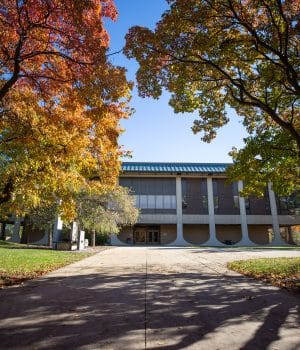
On Dec. 8, 13 Highland Honors students presented their semester projects via Zoom™. Highland’s Honors students created and designed projects based on their own chosen topics.
The Honors Program at Highland Community College is designed to provide eligible students with enhanced educational experiences in select courses chosen in cooperation with College faculty. Students must maintain a 3.5/4.0-grade point average to remain eligible for the Honors Program. Students must possess an ACT composite score of 25 or greater, or 1200 out of 1600 on SAT, or finish in the top 10 percent of their high school graduating class. This is the 14th year of the program.
“The Honors Program provides great opportunities for students to deepen their educational pursuits while at the college,” said Evan Talbert, Honors Program director and Highland instructor. “These presentations are always exciting, as we get to hear what projects our students have developed in conjunction with our instructors, and it is always a great sample of the many different programs and areas of study the college offers.”
Talbert adds, “These projects, and the Honors Program in general, allow our students to dive into concepts which are important to them and their further educational journey, giving them a more in-depth look at these topics.”
The Honors Program provides additional hands-on workforce and learning experience. Students work alongside an instructor to develop and complete the project. Topics include research of a particular field of study, current events or trends, a course’s curriculum, and the student’s interests and goals.
Students who presented were:
Daniel Creuzer of Orangeville completed a chemistry project with Dean of Science and Mathematics and Instructor Dr. Brendan Dutmer, in which he researched the value of implementing Course-based Undergraduate Research Experiences (CUREs) for all Chemistry 222 students.
Olivia Wilhelms of Freeport worked with Instructor Jeremy Monigold to create a computer program and accompanying paper related to purchasing movie tickets and updating inventory.
Clara Bartels of Freeport worked with Instructor Kathy Sleezer on a research paper on how artificial intelligence is used and how it will affect education.
Genesis Cole of Freeport worked with Instructor Laura Early with a research paper on a visual artist’s life, work, and influences and the impact on the artists.
AJ Evon of Freeport worked with Instructor Harry Bodell to complete a “Speech to Entertain” to the Speech class to persuade classmates on a particular topic while using jokes and other humorous elements for audience engagement. AJ also worked with Instructor Laura Early appearing as a character as the Red Dog in the children’s production of “Go, Dog, Go, creating cue lists, memorizing lines and stage direction.
Kee Henze of Ridott worked with Instructor Juliet Moderow researching birds seen on campus and studied their migration patterns, including if and how manmade structures may affect populations.
Alexa Lancaster of Baileyville worked with Julie Hartman-Linck to research and present current sociology topics for Freeport High School students.
Hilaree Lombardo of Rockton worked with Instructors Jessica Larson and Jessica Schneiderman on how such artificial intelligence tools as ChatGPT can be used in nursing education.
Franklin Munda of Freeport worked with Instructor Aaron Sargent by creating models, blueprints and programs for both a soap dish and guitar neck support, as well as creating parts in the CNC mill.
Kaitlynn Smith of Shannon worked with Instructor Jennifer Alderman researching and updating study guides for the Accounting program, making it easier and clearer for future students.
Colleen Stone of German Valley worked with Instructor Tony Grahame on a research paper on the physiology of death, focusing on concepts through the perspectives of anatomy and physiology.
Daeshon Verner of Freeport worked with Instructor Karla Giuffre to conduct a simulated experiment detecting the sickle cell gene using a gel electrophoresis kit, and to educate others on the disease.
Natalie Yeoman of Freeport worked with Instructor Jeremy Monigold to conduct a research paper on self-driving vehicles, specifically about how artificial intelligence is improving and expanding in this area.
For more information on the Honors Program, contact Evan Talbert at evan.talbert@highland.edu.
